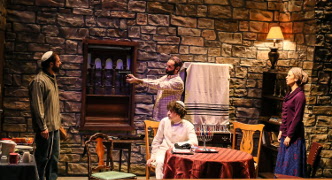
| The
Tragedy of Fanaticism
March 26 to April 26, 2015 Nothing is more tragic and more deadly than the conflict between brothers. In Western tradition it is encapsulated in the biblical post-paradise story between Cain and Abel. The story of Ishmael and Isaac, both sons of Abraham and half brothers, can be looked at as the mythical source of the conflict between the two Semitic cultures, Arabs and Jews. The conflict in present day Israel between the Jewish settlers and local Palestinians has its tragic source in more recent politics. It is a legacy of colonialism, the Holocaust, misguided strategies, and, above all, the factor of fanaticism on both sides. Misha Shulman’s play, inspired by the work of “Breaking the Silence: Israeli Soldiers Talk about the Occupied Territories,” presents side by side two households on Martyrs Street in Hebron, a historical city located near Bethlehem in the Occupied West Bank; one house is inhabited by a young Jewish settler couple, the other belongs to Noor, a Palestinian widow, a university professor, with a teenage daughter. The set design by Stephen Dobay and Caleb Levengood with lighting by Driscoll Otto uses the wide stage to great advantage by showing two identically scaled living rooms, each enclosed by three walls with a low fourth wall towards the audience, thus implying the location of Martyrs Street between the audience and the houses. In the middle of the stage space, perpendicular to the implied street and the audience area is a dark narrow dividing alley between the houses and their entrance doors. The spatial symmetry seems to visualize the author’s message of the presumed symmetry between the actions taken in the play and their tragic consequences. The primary action of fatal involvement between Nimer, the Palestinian Hamas operative, played with cool conviction by Haythem Noor, and Tsadok, the fanatical Jewish settler, played with great passion by Jonathan Raviv, is a rather incredible thought experiment designed by the author, Misha Shulman, to demonstrate the intractable conditions in the territory of the present state of Israel. The play begins with a mysterious exchange or bargain between the two in the dark alley between the houses. One line in their dialog struck me as a clarion call. Tsadok says, “We both are agreed to destroy the state,” and they part having concluded their deal. This turns out to be that Nimer will deliver a suicide vest to Tsadok who will put it on a young confused Jewish boy whom he took into his home and whom he will send out to detonate at an anti-settlement cum peace rally, organized by the Israeli peace movement. Between the first devil’s bargain and the final explosion, the play unveils a number of complicated relationships and subplots among the characters in both households. The characters also present diverse political attitudes within both camps, some of which one would wish could prevail to finally undo this mutual dance of death. Underlying the personal problems on each side are the realities of separate and unequal systems of justice and opportunities.
The Palestinian woman, Noor, played with a balanced grace by Maria
Silverman, seems to have carved out a relatively comfortable existence
for herself as professor. However, she is in danger of losing her
home because of her son Nimer’s Hamas involvement with violence
which has alienated him from her and because of which she has forbidden
him any contact with his sister Aisha, played by Dahlia Azama as a
gangly impulsive teenager. Noor’s loyal friend Salim, played
by Alok Tewari as a moderate, sensible and very concerned friend and
lover, tries to help by using his connections with the Israeli authorities
but this has made him vulnerable to attacks from Nimer. The playwright, Misha Shulman, a former commander in the Israeli Defense Force in charge of education, crafted a play that invites discussion. In fact, on various Sundays during the run of the play, post-performance discussions were held with a number of prominent scholars, policy makers, and theatre professionals. The topic focus ranged from reflections about the war in Gaza, issues of extremism throughout the Middle East, and the challenges in this country when a theatre presents work about Israel and Palestine. The theatre cannot solve political issues but it can help raise questions about consequences—and that theatre tradition goes back to its Athenian origins 2,500 years ago. |
| museums | NYTW mail | recordings | coupons | publications | classified |

